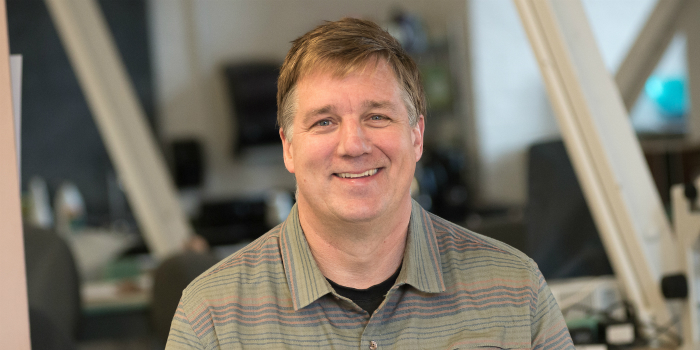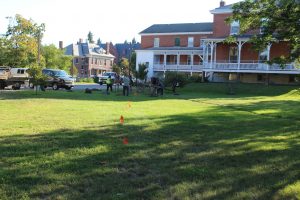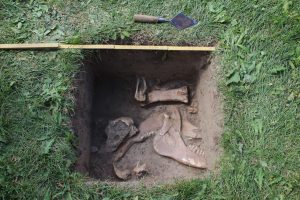Teresa Mares will be teaching a summer course called “Latinos in the US” (ANTH 169) designed as a survey of people of Latino and Hispanic descent living in the United States. Students will learn about the history and diversity of Latinos and how race and ethnicity is defined by anthropologists. It also falls under the category of a D1.

Anthropology Department Blog
Anthropology Major Celina Rossier goes to grad school
Posted: March 31st, 2018 by sbenitoa
Celina will be graduating this May with a major in Anthropology, focusing on Global Health, and a minor in ASL (American Sign Language). She was recently accepted for a Master’s program at Gaulladet University in Washington D.C. where she will continue her education on deaf studies. She will further examine Deaf Culture and ASL using her skills in cultural and linguistic anthropology.
Professor Luis Vivanco’s upcoming travels and research.
Posted: March 31st, 2018 by sbenitoa
After being inspired by a friend to look into the impacts of biking in a community, Luis Vivanco ventures into a new research opportunity around the world. His adventure began in Bogota, during 2014, where he was doing ethnographic research on the city’s bike culture and politics. Bogota has one of the worlds best developed transportation systems which is what brought him there. He is soon travelling to Aarhus, Denmark to look into green urbanism through mobility and how this city can accomplish having biking as the main means of transport and to compare his findings to those from Colombia. Bikes have become the gateway to understanding three completely different cities around the world. Eventually, all this information will come together to become a book.
Anthropology Club Goes to Washington, D.C. for AAA Conference
Posted: December 15th, 2017 by gmarquis
Recently, eleven students from the Anthropology Club had the opportunity to travel to Washington, D.C. to attend the 2017 annual meeting of the American Anthropological Association. They met Professor Luis Vivanco for coffee and discussion, also met with Professor Jeanne Shea, and were graciously given a tour of the city by UVM Anthro alumna Cara Zhuang. A favorite memory from co-president of the Anthro Club, Catie Owen: “One night we went to all the monuments in the National Mall and laid down and put our feet up on the Washington Monument, because it looks like you are walking on this never ending sidewalk.”
Some themes the students encountered and discussed at the conference included mobility, ontology, and anthropology’s historically white/colonialist roots.
Fall 2017 Newsletter
Posted: December 11th, 2017 by ggnelson
We are pleased to announce the publication of our Fall 2017 newsletter! Thank you to professors, current and former students, department administration, and others who contributed to this year’s newsletter.
Anthropology Fall Newsletter 2017
Anthropology Majors and Minors Being Inducted into Phi Beta Kappa Honors Society
Posted: December 6th, 2017 by gmarquis
The following Anthropology majors will be inducted into the Phi Beta Kappa Honors Society this December. Membership in Phi Beta Kappa is a rare honor, and academics and employers recognize it as a mark of intellectual breadth and exceptional academic performance.
The chapter sheltered at the University of Vermont, the Alpha of Vermont, was chartered in 1848, making it the eleventh chapter of Phi Beta Kappa. It has a rich history in its own right, being the first chapter in the nation to elect women and African Americans to membership, which is did in the 1870s. Since 1848, approximately 4,100 UVM students have been inducted.
Our sincerest congratulations to:
Russell Lasdon, Psychological Science major and Anthropology minor.
Eleanor Maloney, Anthropology and Russian double major.
Eileen Parks, Anthropology and English double major and Music minor.
Anthropology student Haji (’19) takes action in Burlington community
Posted: November 7th, 2017 by ggnelson
In late September, Anthropology student Aden Haji ’19 spoke at the United Nations’ headquarters in New York City for the International Peace Day Conference. Haji is a member of UNITE, an organization fostering activism among Vermont youth. Through UNITE’s partnership with the non-profit Children of the Earth, Haji and his peers were invited to the conference in early Fall. Haji writes of the conference, “students met with other young activists from around the world, listened to speeches given by Nobel Prize laureates, and shared their work and ideas. Participants also had the opportunity to carry the flags of the nations of the UN at the Flag Ceremony in Tillman Chapel at the UN Church Center.” When asked why he wanted to attend the conference, Haji says he looked forward to being in an environment with youth leaders and activists from around the world, sharing ideas, and seeing youth-initiated projects in communities.
Certain conference attendees were selected to speak about the action they have taken to promote peace in their communities. Haji spoke about the development of his community-based initiative Speak Up Roosevelt Forum (or, S.U.R.F. for short). The forum’s purpose is to bring community
 members, organizations, and law enforcement together to facilitate discussion of concerns, share stories, as well as foster a stronger, more personal connection. He says there is a “need for more connectivity in the Burlington community,” and S.U.R.F. provides time, space, and an inclusive environment in which difficult discussions can be had. Currently, he estimates there are fifty members who attend meetings regularly. When asked about goals for S.U.R.F., Haji reflects on his vision to allow open communication, communal solutions, and multicultural inclusion. He cites the necessity to make Burlington’s multicultural communities heard and visible. In an effort to involve more community members like UVM students, Haji has partnered with The Mosaic Center for Students of Color. He refers to the gap between UVM students and the Burlington community and explains that involving more students in the place they live benefits both parties.
members, organizations, and law enforcement together to facilitate discussion of concerns, share stories, as well as foster a stronger, more personal connection. He says there is a “need for more connectivity in the Burlington community,” and S.U.R.F. provides time, space, and an inclusive environment in which difficult discussions can be had. Currently, he estimates there are fifty members who attend meetings regularly. When asked about goals for S.U.R.F., Haji reflects on his vision to allow open communication, communal solutions, and multicultural inclusion. He cites the necessity to make Burlington’s multicultural communities heard and visible. In an effort to involve more community members like UVM students, Haji has partnered with The Mosaic Center for Students of Color. He refers to the gap between UVM students and the Burlington community and explains that involving more students in the place they live benefits both parties.
As for Haji’s other achievements, he is on the board of directors for two organizations, Spectrum Multicultural Youth Program and Young Traditions. As an anthropology student with a focus in cultural anthropology, he will be applying his studies to the S.U.R.F. program through an independent study this spring.
Archaeological Investigation on UVM Campus
Posted: September 6th, 2017 by dblom
Professor Luis Vivanco and Collaborators Awarded NEH Grant to Update the Popular Image of Vermont Farmer
Posted: September 5th, 2017 by dblom
Professor John Crock’s Caribbean Research Highlighted in Environmental Archaeology: The Journal of Human Palaeoecology
Posted: August 31st, 2017 by dblom
‘Marineness’, the Underwater Seascape and Variability in Maritime Adaptations in the Late Ceramic Age Northern Lesser Antilles
by John G. Crock, Nanny Carder and Wetherbee Dorshow
To investigate potential variation between the fishing practices of contemporaneous Late Ceramic Age villages in the northern Lesser Antilles, we model expectations for each site based on local marine habitat and bathymetry and compare them to observed differences in zooarchaeological assemblages. The predictive model approximates which taxa were the most likely to have been targeted by fishers from each site, assuming that the majority of fishing likely occurred within short distances from each settlement. A comparison of expectations and archaeological observations is used to expose potential differences between sites in preferred fishing areas and techniques, preferred foods, or social distinctions. This variability is argued to reflect a fishing community’s ‘marineness’, or the interrelationship members have with the unique composition of marine resources and underwater seascape adjacent to their villages.

Dr. Crock in the UVM Anthropology Laboratory








Recent Comments